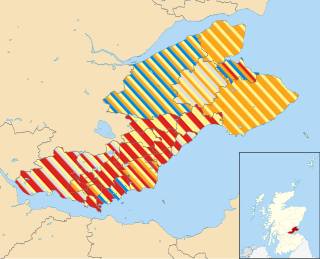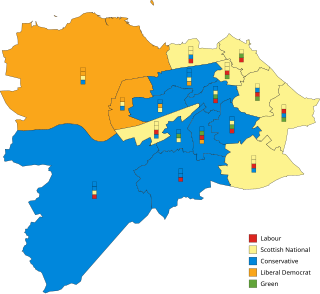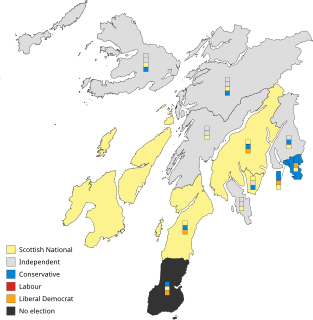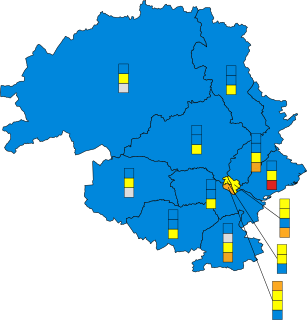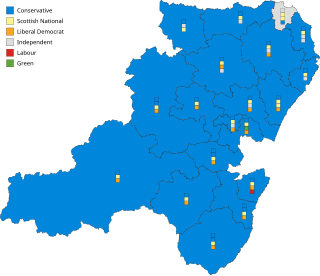Elections to East Dunbartonshire Council were held on Thursday 4 May, the same day as the 31 other local authorities in Scotland. The election used seven wards created under the Local Governance (Scotland) Act 2004, a reduction of one from 2012, with 22 Councillors being elected, 2 fewer overall. Each ward elected either 3 or 4 members, using the STV electoral system.

The Local Governance (Scotland) Act 2004 is an Act of the Scottish Parliament which provided, amongst other things, for the election of councillors to the local authorities in Scotland by the single transferable vote system.
The single transferable vote (STV) is a voting system designed to achieve proportional representation through ranked voting in multi-seat organizations or constituencies. Under STV, an elector (voter) has a single vote that is initially allocated to their most preferred candidate. Votes are totalled and a quota derived. If their candidate achieves quota, he/she is elected and in some STV systems any surplus vote is transferred to other candidates in proportion to the voters' stated preferences. If more candidates than seats remain, the bottom candidate is eliminated with his/her votes being transferred to other candidates as determined by the voters' stated preferences. These elections and eliminations, and vote transfers if applicable, continue until there are only as many candidates as there are unfilled seats. The specific method of transferring votes varies in different systems.
Contents
- Election Result
- Ward results
- Milngavie
- Bearsden North
- Bearsden South
- Bishopbriggs North and Campsie
- Bishopbriggs South
- Lenzie & Kirkintilloch South
- Kirkintilloch East & North & Twechar
- References
The election saw the Scottish National Party elected as the largest group to replace Labour, which lost all but 2 seats to form the fourth largest group. The Scottish Conservative and Unionist Party gained 4 seats to achieve their highest ever number of councillors, and topped the poll in 5 out of the 7 Wards, while the Scottish Liberal Democrats gained 3 seats. The Independent councillor Duncan Cumming retained his seat.
The Scottish National Party is a Scottish nationalist and social-democratic political party in Scotland. The SNP supports and campaigns for Scottish independence. It is the second-largest political party by membership in the United Kingdom, behind the Labour Party and ahead of the Conservative Party, it is the third-largest by overall representation in the House of Commons, behind the Conservative Party and the Labour Party, and it is the largest political party in Scotland, where it has the most seats in the Scottish Parliament and 35 out of the 59 Scottish seats in the House of Commons of the Parliament of the United Kingdom. The current Scottish National Party leader, Nicola Sturgeon, has served as First Minister of Scotland since November 2014.
The Scottish Labour Party is the devolved Scottish section of the UK Labour Party.
The Scottish Conservatives, officially the Scottish Conservative and Unionist Party, is the branch of the Conservative Party in the United Kingdom that operates in Scotland. Describing itself as a "patriotic party of the Scottish centre-right", it is the second-largest party in the Scottish Parliament and Scottish local government. It also sends the second-largest Scottish representation to the House of Commons of the United Kingdom, after the SNP in each respect.
Former leader of the council and Labour councillor Rhondda Geekie lost her seat as did the former leader of the SNP Group Ian Mackay.
Following the election the SNP formed a minority Administration, although the position of Provost was filled by Conservative Councillor Alan Brown. The Minority Administration was however short lived as on the 21st December 2017 Cllr Gordan Low resigned his position as Leader of the Council as did all SNP Councillors from their Administration posts. In an unexpected turn, only weeks later SNP Councillor Jim Gibbons usurped his SNP collegue's position as Convenor of the Licensing Board after Councillor John Jamieson had resigned.
On the 20th March 2018 Conservative Leader Councillor Andrew Polson and Lib Dem Leader Vaughan Moody were elected as Co-Leaders of the new Joint Administration, a first in East Dunbartonshire
| |||||||||||||||||||||||||||||||||||||||||||||||||||||||||||||
| |||||||||||||||||||||||||||||||||||||||||||||||||||||||||||||
All 22 seats to East Dunbartonshire Council 12 seats needed for a majority | |||||||||||||||||||||||||||||||||||||||||||||||||||||||||||||
|---|---|---|---|---|---|---|---|---|---|---|---|---|---|---|---|---|---|---|---|---|---|---|---|---|---|---|---|---|---|---|---|---|---|---|---|---|---|---|---|---|---|---|---|---|---|---|---|---|---|---|---|---|---|---|---|---|---|---|---|---|---|
| |||||||||||||||||||||||||||||||||||||||||||||||||||||||||||||
| |||||||||||||||||||||||||||||||||||||||||||||||||||||||||||||




